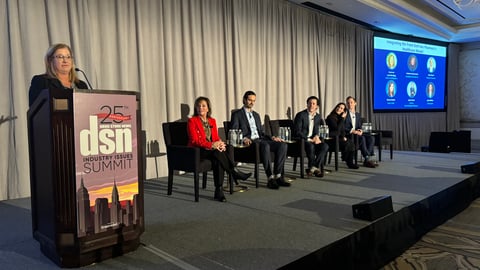Retail pharmacy in the age of AI
Forty six percent of executives believe AI cognitive computing and cloud applications will be the areas of our greatest investment in the next three years. So said Sharon Gai, an expert in e-commerce, digital transformation and AI, during her keynote address at Drug Store News’ 25th annual Industry Issues Summit.
The presentation, sponsored by The Emerson Group, was titled, “Generative AI Glow-Up: New Radiance in Health, Wellness & Beauty CPG.”
Gai, who worked at Alibaba for a decade, shared insights from the Chinese market, which she noted is the world’s largest online consumer market.
“In our $100 trillion world economy, it is the second largest economy, but it’s also the world’s largest developing economy,” Gai said. Pointing out that China’s population is about 1.4 billion people, Gai said, “You’re going to get a plethora of different brands. China also is the world’s most competitive market. When you have a lot of competition, you’re naturally going to have a lot more models that come out of that market.”
Gai took the audience back in time to 1999, when Alibaba founder Jack Ma toured the United States. “China didn’t really have a search engine available, but he got his hands on the latest search engine at the time and when Ma searched for American products like beer and searched for German beer, there were a lot of results, but when he searched for Chinese beer, or anything else Chinese, the screen returned blank,” she said.
[Read more: Generation next: Capturing millennial, Gen Z shoppers]
When Ma realized the entirety of China was not online, he went back to China and picked 18 students who had no experience in the Internet, e-commerce or building web tools. They started to build the first product, Alibaba.com, which is still standing today.
Fast forward 20 years. Gai described how the Internet economy took off in China with a variety of different apps. “The Chinese Internet is really like a parallel universe to everything we have in America—the Amazons, the Googles, the LinkedIns and Twitters–but it’s a little more interconnected because of the amount of AI that’s embedded in these products,” she said.
When these apps were being built the Chinese tech founders adhered to what Gai called, “first principles thinking,” which is breaking down very complex problems and rebuilding them.
When this concept is applied to e-commerce, which is how a lot of different tech apps and tools were built in China, there are three components: your consumer, merchandise or service and the context with which you bring these two variables together. “The changes that happen with these three things create the mountain of different possibilities you can have in the e-commerce space,” Gai said. “This is how Alibaba went from one little web page, alibaba.com, to the entirety of its company.
Next, Gai took the discussion to Alibaba Health, noting that China only has about 1.8 doctors per every 1,000 people compared to 2.4 in the United States and 2.8 in the U.K. “This means that resources in health care are very strained in China. When there’s a lot of competition, it breeds innovation. That‘s exactly what Alibaba Health has in terms of its growth trajectory,” she said.
AliHealth started as a cloud pharmacy, but its product managers recognized that people were searching for grocery and skin care items, OTCs or certain drugs. “Ali pharmacy was pulled out of Tmall and a separate app was created,” she explained
“The product managers noted that there were people searching to buy contact lenses and prescription eyeglasses, they needed eye exams and physical exams, they were looking for sexual health products, or wanted to do STD tests or pregnancy tests. This became a snowball effect and the number of services this app started to cater to. Today Alibaba Health is a full fledged telehealth app.”
[Read more: Five retail pharmacy trends for 2024]
Gai also discussed how a medical doctor app was created for traditional Chinese medicine, a huge Chinese sector that she described as “a very old school brick and mortar place to play.” “What this medical doctor app did was digitize that entire process,” she said. “You open the app, consult with the Chinese medicinal doctor and he will tell you what you need and an entire packet of ingredients will be shipped right to your doorstep.”
Addressing the last pillar of Alibaba Health, a business to business pillar in which the creators built out a health knowledge map and traceability code, Gai said, “AliHealth set a standard in
creating a QR code that every single brand would need to stick on their packaging so when this product is shipped to the end customer, they can scan it and see exactly where this medicine came from. This is the interface of the telehealth app, where you also can see the balance on your health insurance card, nearby hospitals, a doctor for an online experience, get medicine delivered in around 30 minutes to an hour, order vaccinations, get eye exams, mental health services and medical beauty.”
The app also features short-form videos that offer health advice from doctors, who are becoming influencers. “As a user, you’re constantly learning about health care in general. What AliHealth really did, the big innovation, is consumerization of healthcare services,” Gai said.
Lastly, Gai said that AliHealth is good at “new retail,” a term developed by Jack Ma in 2016. “It’s basically the unification or the synchronization of online and offline services,” she said.




